Revenue Operations Analyst Resume Guide
Revenue operations analysts are responsible for managing, analyzing, and optimizing revenue processes. They review financial data to identify areas of improvement in the sales process and provide insights into customer behavior. Additionally, they use analytics tools to monitor key performance indicators (KPIs) such as conversion rates and average order values.
You have a knack for analyzing data and optimizing revenue operations. To make sure employers take notice of your skills, you must craft an eye-catching resume that highlights all the value you bring to their team.
This guide will walk you through the entire process of creating a top-notch resume. We first show you a complete example and then break down what each resume section should look like.
Table of Contents
The guide is divided into sections for your convenience. You can read it from beginning to end or use the table of contents below to jump to a specific part.
Revenue Operations Analyst Resume Sample
Tony Ratke
Revenue Operations Analyst
tony.x.ratke@gmail.com
214-341-8869
linkedin.com/in/tony-ratke
Summary
Proficient revenue operations analyst with 5+ years of experience driving growth for B2B and SaaS companies. Experienced in developing, implementing, and managing revenue-focused processes that improve customer loyalty and boost sales. At XYZ Company, restructured the pricing model to generate an additional $1M USD/year in top line revenue while reducing costs by 6%. Skilled at using Salesforce CRM to maximize data analysis efficiency.
Experience
Revenue Operations Analyst, Employer A
San Diego, Jan 2018 – Present
- Collaborated with cross-functional teams to develop and implement short-term business strategies, resulting in a 12% increase in revenue.
- Forecasted sales performance on a weekly basis using data from multiple sources within the organization; identified potential areas for improvement & cost savings that yielded $10,000 of increased profits over 6 months.
- Formulated tools and process flows related to operations such as order fulfilment, invoicing and customer service management; improved accuracy by 33%.
- Utilized advanced analytics techniques (SQL/Python) to analyze detailed correlations between customer segments and product offerings which enabled the creation of targeted marketing campaigns with an additional 25% return on investment (ROI).
- Thoroughly validated financial reporting models through extensive testing procedures, ensuring compliance with all regulatory standards while minimizing errors by 40%.
Revenue Operations Analyst, Employer B
Spokane, Mar 2012 – Dec 2017
- Facilitated the efficient growth of revenue operations by streamlining processes and optimizing workflows, resulting in a 17% increase in monthly revenues.
- Achieved cost savings from renegotiating contracts with vendors and suppliers; saved an average of $4500/month through reduced overhead costs.
- Analyzed data to identify areas for improvement, such as customer segmentation strategies that increased sales by 35%.
- Meticulously tracked budgeting performance against set goals and objectives on a weekly basis to ensure accuracy and efficiency within the departmental operations process.
- Demonstrated expertise in developing reports using SQL queries, Tableau dashboards and other analytics tools to provide insights into ROI levels across all business units over time.
Skills
- Financial Modeling
- Data Analysis
- Business Intelligence
- Salesforce
- CRM
- Revenue Forecasting
- Pricing Strategies
- Process Optimization
Education
Bachelor of Science in Business Administration
Educational Institution XYZ
Nov 2011
Certifications
Certified Revenue Operations Analyst
Revenue Operations Certification Institute
May 2017
1. Summary / Objective
A resume summary/objective is the first thing a potential employer will read, so make sure it is compelling and outlines your best qualities. As a revenue operations analyst, you could mention your experience in data analysis and financial modeling, as well as any certifications or awards you have received for excellence in this field. You can also talk about how you helped improve operational efficiency at previous companies by streamlining processes or implementing new systems.
Below are some resume summary examples:
Accomplished revenue operations analyst with 5+ years of experience leading end-to-end business process optimization initiatives. Proven track record of increasing efficiency and accuracy through automation, analytics, and reporting framework implementations. Skilled in developing data-driven insights to drive strategic decision making across the organization. Seeking to leverage my skillset at XYZ Company to optimize revenue streams.
Enthusiastic and organized revenue operations analyst with 3+ years of experience in the finance and marketing industries. Proven ability to analyze data, identify opportunities for improvement, and optimize processes across a variety of departments. At XYZ, successfully created an automated forecasting process that increased monthly revenues by 25%. Highly skilled at creating financial models using Excel and Power BI.
Energetic revenue operations analyst with 5+ years of experience in the financial services industry. Specializes in creating and executing strategies to increase revenue growth, improve customer retention rates, and streamline operational processes. Experienced in developing pricing models, driving automation initiatives, implementing CRM systems, conducting cost/benefit analyses on process improvements projects.
Seasoned revenue operations analyst with 5+ years of experience streamlining processes and analyzing data to drive growth. Successfully developed custom reports, dashboards, and automated workflows that enabled a 15% reduction in manual work for sales teams at ABC Company. Experienced in utilizing Salesforce, Tableau, Excel/VBA coding to uncover insights and create actionable strategies for revenue optimization.
Talented revenue operations analyst with 5+ years of experience optimizing revenue streams and improving customer retention. Looking to join ABC Company in leveraging my expertise towards enhancing their existing business processes, driving growth for the company, and delivering a superior customer experience. Key achievements include increasing renewal rate by 15% within 6 months at XYZ Inc.
Passionate revenue operations analyst with 5+ years of experience driving data-driven business decisions, streamlining operational processes and improving customer service. Seeking to join ABC’s Operations team to optimize the company’s revenue generation strategies through use of analytics and insights. At XYZ improved customer retention rate by 20% while reducing churn by 10%.
Driven revenue operations analyst with 5+ years of experience optimizing and managing sales processes for a wide variety of businesses. Seeking to bring strategic vision, data-driven insights, and meticulous analysis to ABC Tech’s revenue operations team. Achieved 27% improvement in customer retention rate by leveraging dynamic segmentation strategies from upselling campaigns.
Reliable revenue operations analyst with 5+ years of experience in financial analysis, forecasting and budgeting for high-growth companies. Seeking to utilize strong analytical skills and revenue management technology expertise to join ABC Company’s growing team. At XYZ Inc., increased revenue by 15% through efficient business process optimization strategies.
2. Experience / Employment
The work history/experience section is where you can talk about your professional accomplishments. It should be written in reverse chronological order, which means the most recent job is listed first.
Stick to bullet points mainly when writing this section; doing so makes it easier for the reader to quickly understand what you have done and achieved. When describing each role, focus on quantifiable results that demonstrate how successful or impactful your work was.
For example, instead of saying “Analyzed customer data,” you could say, “Identified trends in customer behavior by analyzing 2 million+ records using Python scripts and Tableau visualizations resulting in a 10% increase in revenue.”
To write effective bullet points, begin with a strong verb or adverb. Industry specific verbs to use are:
- Analyzed
- Monitored
- Forecasted
- Optimized
- Generated
- Implemented
- Streamlined
- Resolved
- Reconciled
- Automated
- Collaborated
- Reported
- Managed
- Tracked
Other general verbs you can use are:
- Achieved
- Advised
- Assessed
- Compiled
- Coordinated
- Demonstrated
- Developed
- Expedited
- Facilitated
- Formulated
- Improved
- Introduced
- Mentored
- Participated
- Prepared
- Presented
- Reduced
- Reorganized
- Represented
- Revised
- Spearheaded
- Structured
- Utilized
Below are some example bullet points:
- Prepared detailed revenue reports by analyzing and reconciling data from multiple sources, resulting in a 5% increase in operational efficiency.
- Spearheaded the development of an automated dashboard to track customer retention rate; identified and resolved key issues that had caused over $50K losses within 6 months.
- Generated financial forecasts for upcoming quarters based on past performance and market conditions, helping company executives make sound decisions with regards to budget allocation strategies.
- Actively monitored sales trends across all product lines while identifying areas of improvement; implemented process changes which yielded up to 15% higher profits during peak seasons compared to previous years’ results.
- Assessed current pricing policies against industry benchmarks and conducted competitive analyses of other products/services offered by competitors; recommended new plans that saved the company upwards of $25K annually in associated costs.
- Reduced operational costs by $128,000 in the last quarter through diligent analysis of financial data and optimization of revenue processes.
- Tracked customer invoices and payments on a daily basis to ensure that all revenues were collected on time; improved collection rate by 15%.
- Streamlined billing procedures for 500+ customers using automated systems, resulting in an average reduction of 10 hours per week spent on manual paperwork processing.
- Managed monthly reconciliation projects between accounting records and operational reports with 100% accuracy; identified potential risks & inconsistencies within financial data quickly and effectively without supervision or guidance from senior staff members.
- Diligently reviewed budgeting plans quarterly, ensuring that resources allocated met organizational goals while maintaining overall profitability levels at above-average standards each month.
- Substantially increased revenue by 10% through strategic analysis of customer segmentation, pricing optimization and sales tracking.
- Compiled detailed financial reports on operations performance, identified areas for improvement and created action plans to maximize resources in order to increase profits by $25K over the course of a year.
- Revised existing processes for data collection, manipulation and reporting; streamlined workflows resulting in improved accuracy with a 50% reduction in turnaround time from project initiation to completion.
- Automated daily forecasting models that tracked historical trends among customers while also predicting future outcomes; increased operational efficiency by 35%.
- Structured an innovative system enabling real-time monitoring of key metrics like website traffic & user engagement which generated enhanced insights into customer behavior leading to more effective marketing campaigns and increasing annual revenues by 20%.
- Presented monthly revenue projections to senior management, accurately forecasting expected sales by 5% and increasing total revenues by $400,000.
- Resolved billing discrepancies with customers quickly and efficiently; reduced unpaid invoices backlog from 3 weeks to 1 week within 6 months of joining the team.
- Represented company at industry conferences in order to cultivate relationships with key stakeholders while driving successful business development initiatives that resulted in a 20% increase in customer acquisition rate.
- Accurately tracked daily financial records using Salesforce CRM tools and identified areas for improvement resulting in an average saving of 8 hours per month on administrative tasks.
- Participated actively as part of several cross-functional teams focused on optimizing processes related to pricing strategies, marketing campaigns & lead generation activities which increased overall ROI by 25%.
- Expedited revenue operations processes by reorganizing and streamlining workflows, reducing the time required to complete tasks by 50%.
- Reorganized salesforce data architecture in order to improve customer segmentation analysis; resulted in a 10% increase in revenue within 2 months of implementation.
- Successfully reconciled discrepancies between accounts receivable & payable ledgers for 6 clients with total outstanding invoices worth $1 million.
- Introduced automated billing procedures that reduced manual errors from 15% to 5%, leading to an improvement in client satisfaction ratings by 20 points on average.
- Developed accurate monthly financial statements reflecting sales performance across all product categories, enabling senior management make informed decisions regarding budget allocation and profitability goals.
- Optimized revenue operations by setting up automated billing processes, resulting in a 10% increase in monthly revenue.
- Advised sales and marketing teams on business strategies to maximize their ROI, achieving an additional $50K+ of cross-sell/upsell opportunities within the first quarter.
- Improved customer service experience through streamlining order fulfillment process; reduced turnaround time for orders by 80%.
- Reported weekly results to stakeholders with accurate data analysis and insights into trends that affected performance metrics; enabled key decision makers to react quickly when faced with challenges or new opportunities.
- Independently managed end-to-end revenue cycle from invoicing clients through collecting payments, increasing collections rate by 15%.
- Monitored company’s financial performance and identified opportunities to increase revenue by 15% through analyzing data from multiple sources.
- Implemented initiatives for pricing, product bundling and promotional campaigns that resulted in an additional $4 million in sales growth over the last quarter.
- Mentored a team of 4 junior analysts, guiding them on best practices for evaluating customer trends and market conditions while maintaining high standards of accuracy with all calculations/forecasts.
- Efficiently managed daily operations related to subscription-based services, ensuring timely invoicing & payments which reduced overdue receivables by 18%.
- Developed analytical models using Excel spreadsheets/SQL programming to identify potential areas of risk or opportunity across different departments; communicated findings & recommendations to senior management regularly.
3. Skills
Skill requirements will differ from employer to employer – this can easily be determined via the job advert. Organization ABC may require experience with Salesforce and Organization XYZ may require knowledge of Oracle ERP.
It is essential to keep this in mind when crafting your resume, as many employers utilize applicant tracking systems which scan resumes for certain keywords before passing them on to a human. Therefore, you want to tailor the skills section of your resume to each job that you are applying for.
Once listed here, it would be beneficial if you could further elaborate on those skills by discussing them in more detail elsewhere – such as the summary or experience sections – so potential employers can get a better understanding of how they apply directly to their company’s needs.
Below is a list of common skills & terms:
- Business Intelligence
- CRM
- Data Analysis
- Financial Modeling
- Pricing Strategies
- Process Optimization
- Revenue Forecasting
- Salesforce
4. Education
Including an education section on your resume will depend largely on how far along you are in your career. If you just graduated and have no prior work experience, mentioning your education below the objective is a good idea. However, if you already have significant professional experience to showcase, an education section may not be necessary at all.
If including an education section is appropriate for the position, try to highlight courses or certifications related to revenue operations analyst roles that may make you stand out from other applicants.
Bachelor of Science in Business Administration
Educational Institution XYZ
Nov 2011
5. Certifications
Certifications are a great way to demonstrate your expertise in a particular field or skill. They provide tangible evidence that you have the knowledge and experience needed for the job, as well as prove that you are actively keeping up with industry trends.
When applying for any role, make sure to include any certifications relevant to the position on your resume so potential employers can see how qualified you are. This will help give them confidence in hiring you and could be the deciding factor between two equally strong candidates.
Certified Revenue Operations Analyst
Revenue Operations Certification Institute
May 2017
6. Contact Info
Your name should be the first thing a reader sees when viewing your resume, so ensure its positioning is prominent. Your phone number should be written in the most commonly used format in your country/city/state, and your email address should be professional.
You can also choose to include a link to your LinkedIn profile, personal website, or other online platforms relevant to your industry.
Finally, name your resume file appropriately to help hiring managers; for Tony Ratke, this would be Tony-Ratke-resume.pdf or Tony-Ratke-resume.docx.
7. Cover Letter
Cover letters are an important part of the job application process. They are a great way to introduce yourself and demonstrate why you would be the perfect fit for the role.
Cover letters should typically consist of 2-4 paragraphs, each one providing more detail about your skills, experience, qualifications and suitability for the position. Writing a cover letter is not always mandatory but it can give you an edge over other applicants and provide recruiters with more insight into who you are as a professional.
Below is an example cover letter:
Dear Chyna,
I am writing in response to your posting for a Revenue Operations Analyst. With experience analyzing data, developing reports, and improving processes for a SaaS company, I am confident I will be an asset to your organization.
In my current role as Revenue Operations Analyst at [company name], I work with cross-functional teams to identify areas of improvement within the revenue cycle. I have developed a deep understanding of the Salesforce CRM platform and utilize my skills in SQL to generate actionable insights from data that improve team performance and drive business growth.
A few notable accomplishments include:
– Developing a reporting dashboard in Tableau that tracks key performance indicators for the sales team and provides visibility into trends and areas of opportunity; this dashboard is now used by senior leadership to make data-driven decisions about resource allocation and strategy
– Creating a process for automating manual tasks within the sales order management system that saved the team an average of 2 hours per week; this allowed them to focus on more value-added activities such as prospecting new customers
Sincerely,
Tony
Revenue Operations Analyst Resume Templates
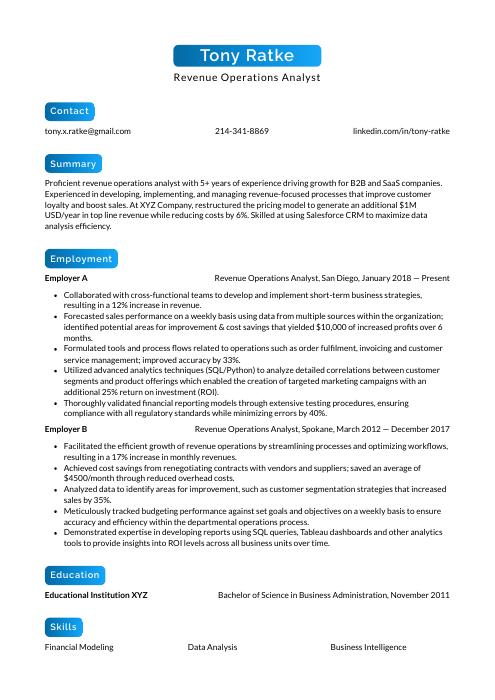 Kinkajou
Kinkajou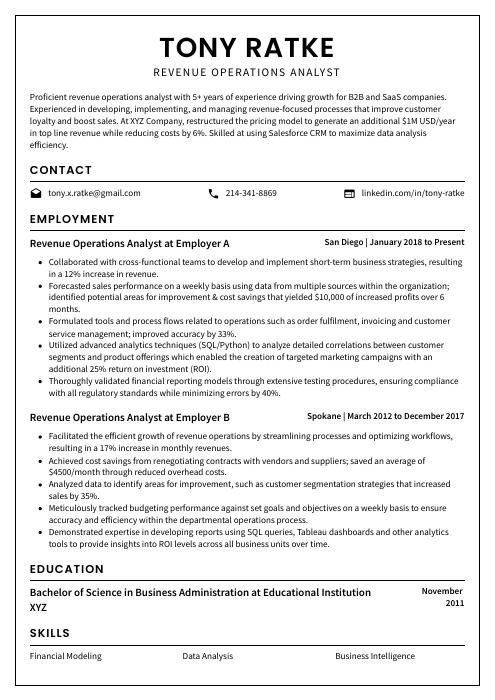 Cormorant
Cormorant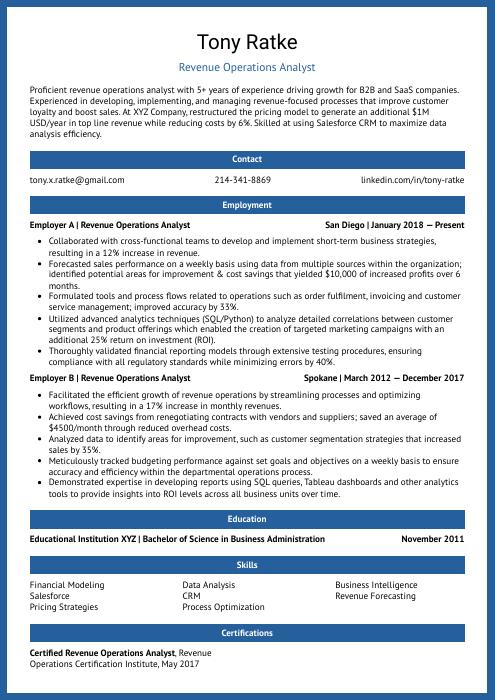 Ocelot
Ocelot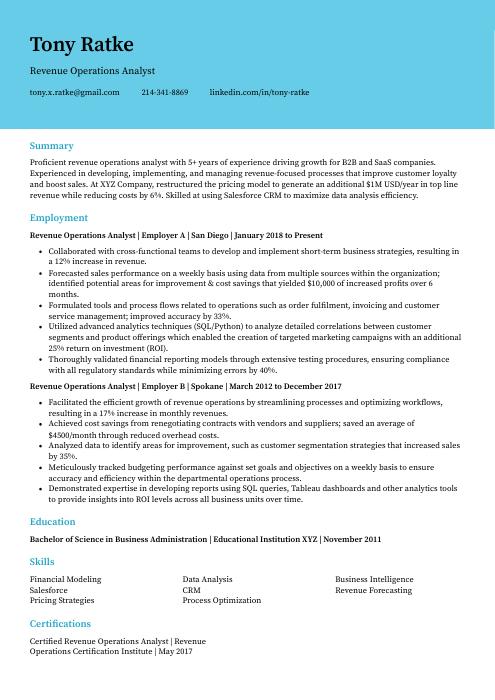 Dugong
Dugong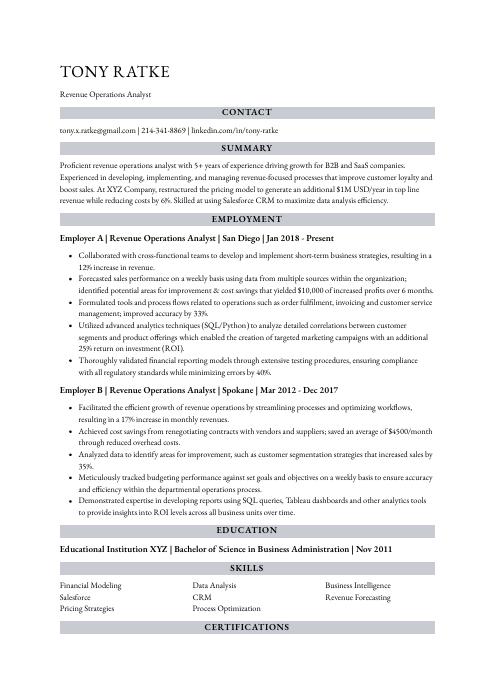 Numbat
Numbat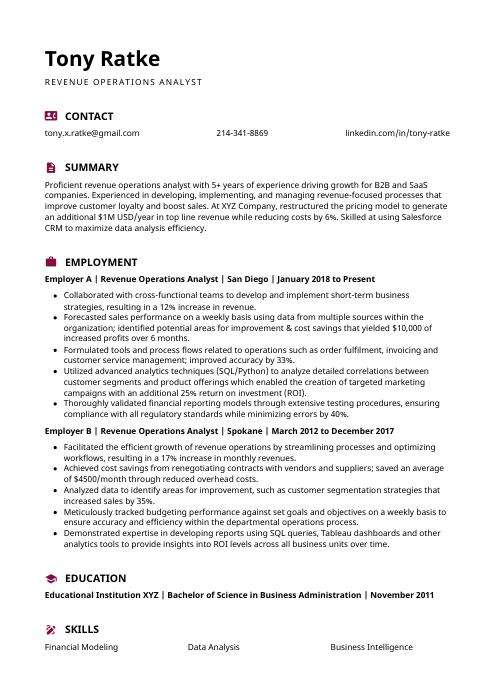 Hoopoe
Hoopoe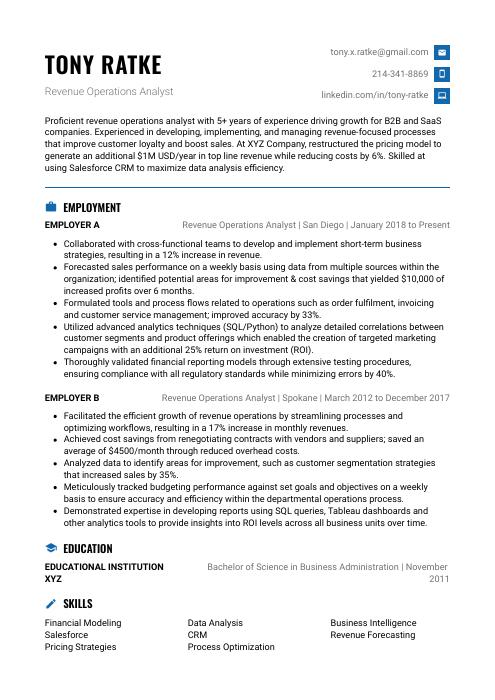 Echidna
Echidna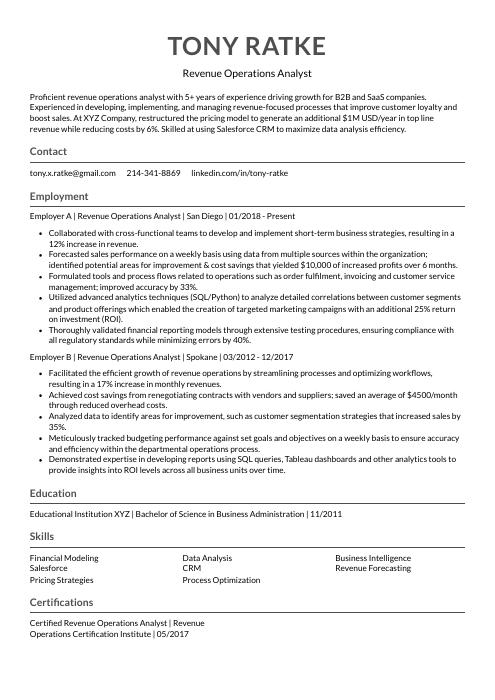 Indri
Indri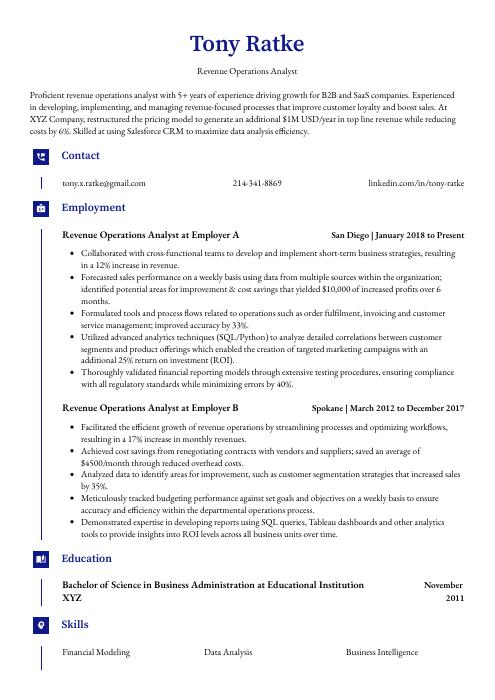 Gharial
Gharial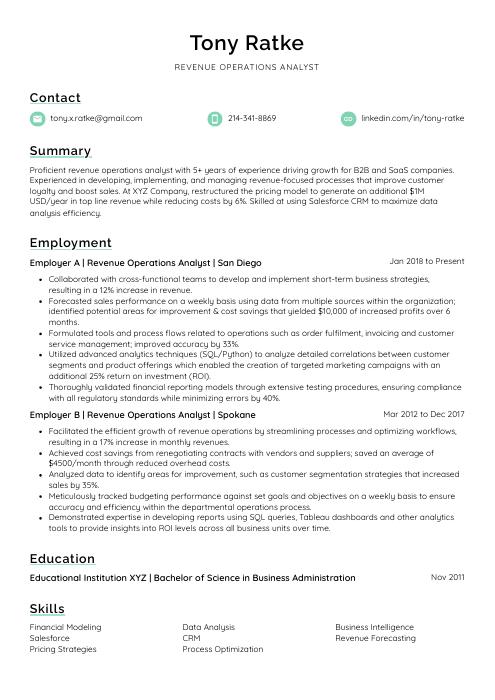 Lorikeet
Lorikeet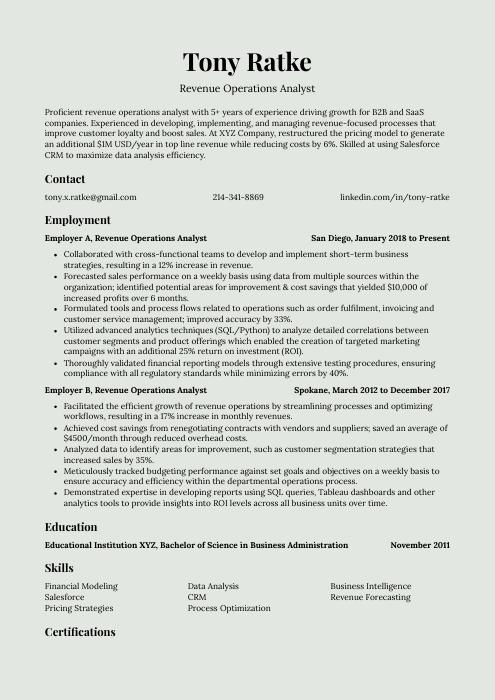 Saola
Saola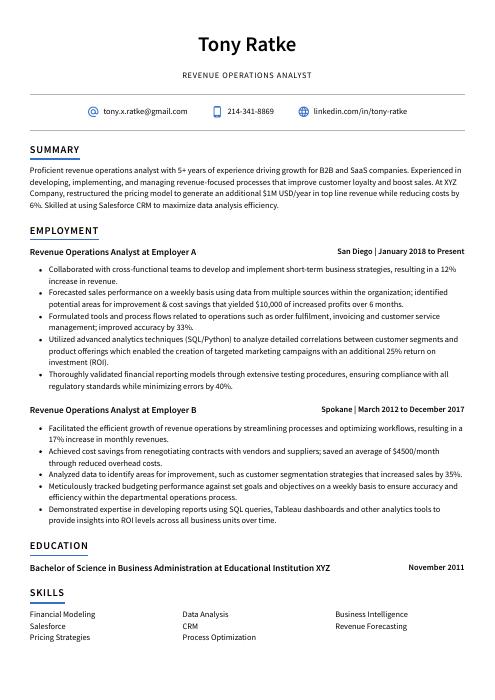 Axolotl
Axolotl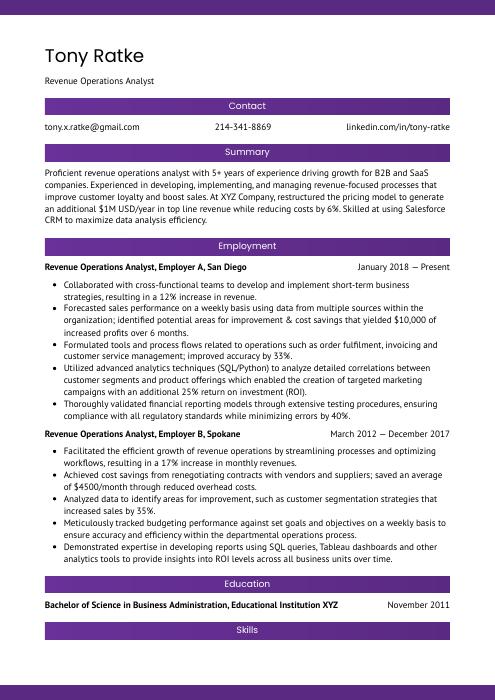 Jerboa
Jerboa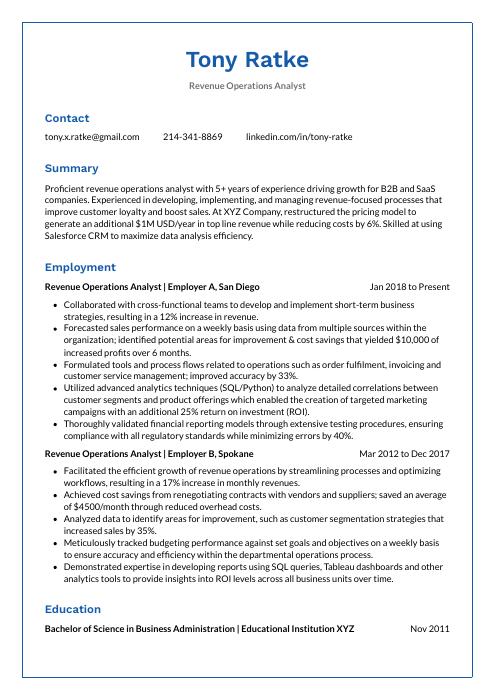 Markhor
Markhor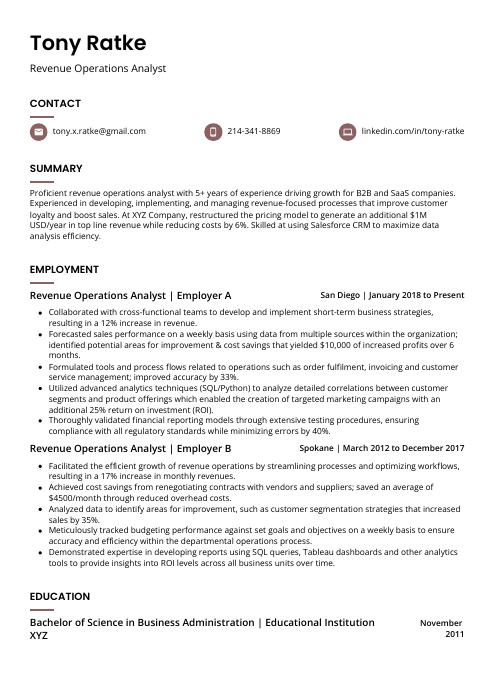 Fossa
Fossa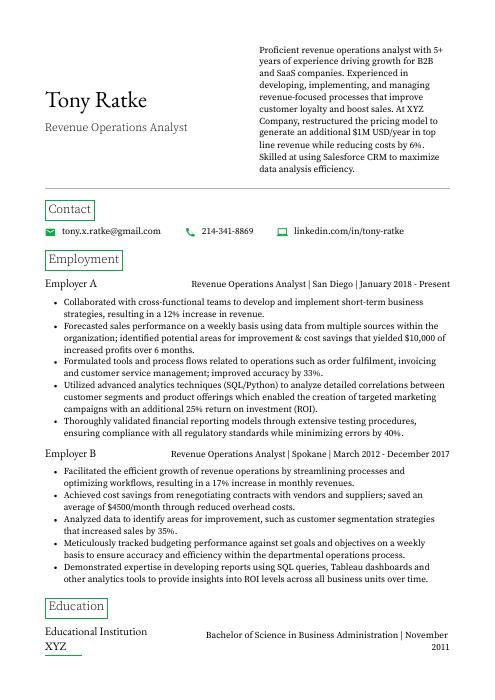 Quokka
Quokka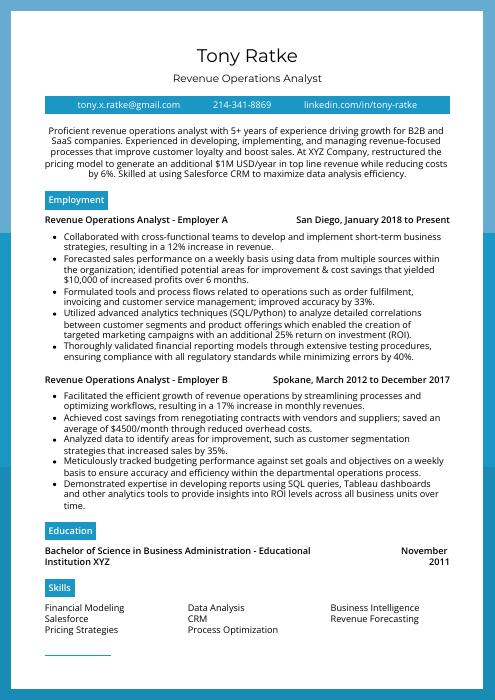 Rhea
Rhea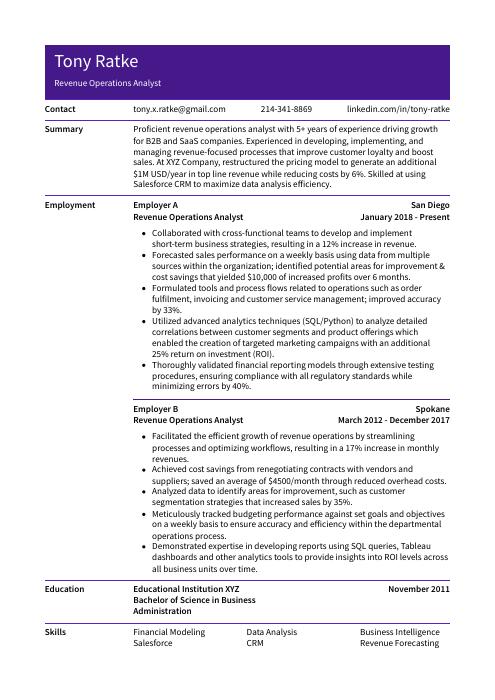 Pika
Pika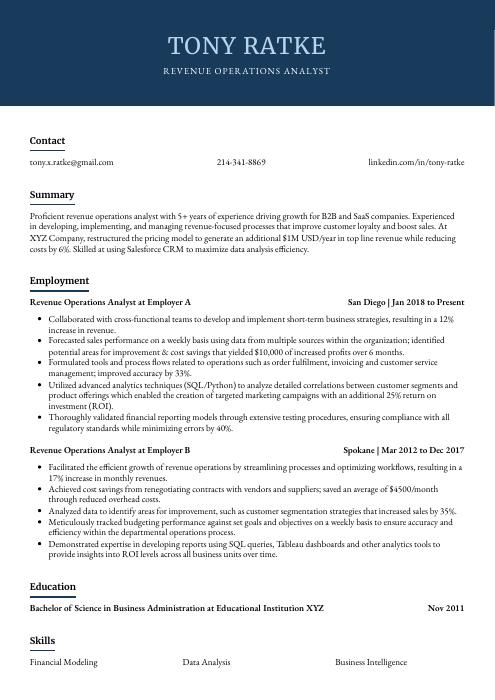 Bonobo
Bonobo Rezjumei
Rezjumei
